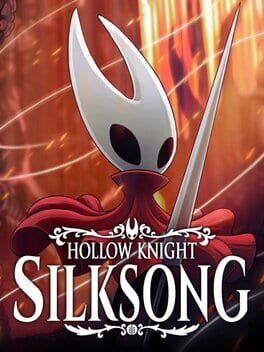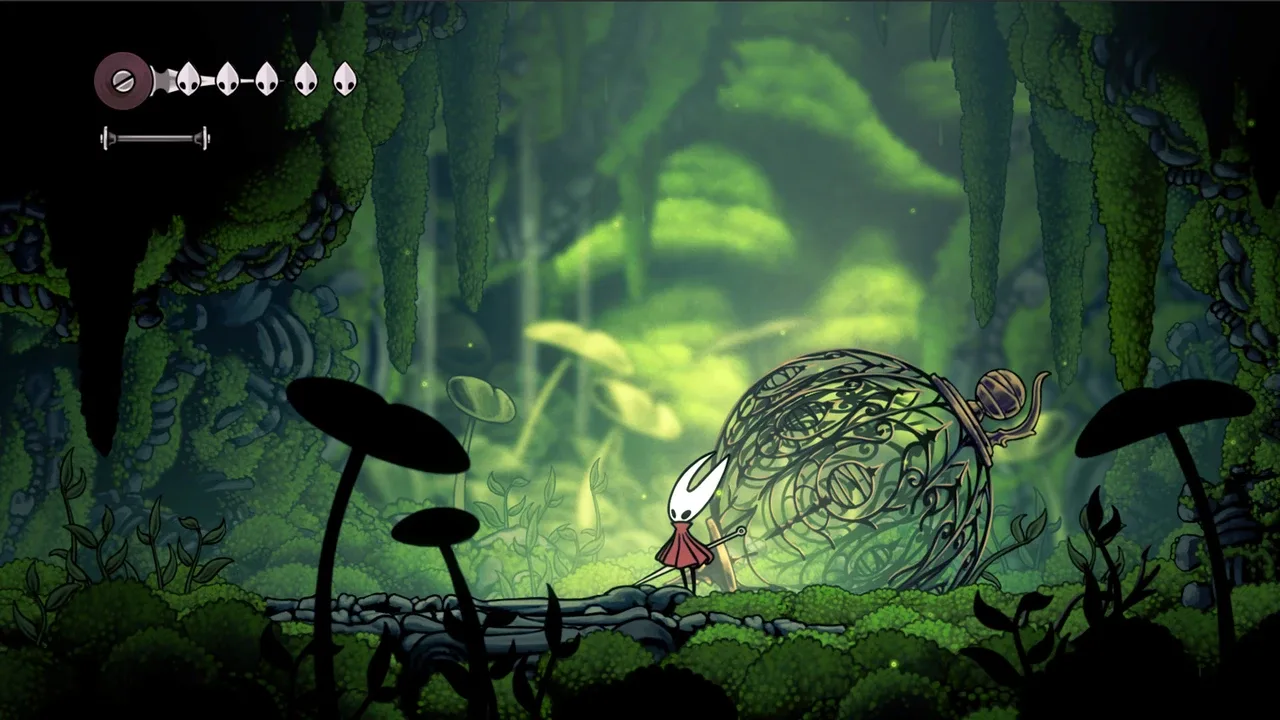
nex3
BACKER
reviewed
Hollow Knight: Silksong

This is an impressive follow-up to Hollow Knight not
just in that it's another very good game (absolutely not a
guarantee from a developer with only one game under their
belt, no matter how successful that game was), but in that it
understands deeply what makes a game effective specifically as
a sequel. It's a checkerboard of expectations met and
subverted: the core logic of the combat and feel of movement
is essentially the same, but the single most powerful tool in
HK1—the downward aerial "pogo" attack—is dramatically harder
to use. Even early game bosses often do 2 masks of damage, but
Hornet can heal three masks at a time. The familiar spell
mechanic is back (renamed "skills" but otherwise identical)
but it's augmented with equippable weapons that use a totally
new economy.
The result is a game that presents the player, from the moment they first try platforming with the new diagonal aerial attack, with a potent cocktail of familiarity and challenge. This proved too much for players who expected their skill at HK1 to automatically make them excellent at Silksong, but it's excellent design. A new game should challenge old players, and when those challenges subvert the best play patterns in the first game, they increase the challenge more for experienced players than they do for players who (perhaps boldly) pick up Silksong as their first entry in the series. Silksong demands that the player adapt to new styles of movement and resource economies, but at its heart it's still a game about careful positioning and weaponized acrobatics.
So, is it hard? Not really. For all the hullabaloo on release about how difficult Silksong is, the main difference between its main quest bosses and Hollow Knight's are that the early-game bosses are somewhat harder, which is about what one would expect from a sequel. Once you get past the first few intro bosses, you end up at around the level of HK1 bosses in similar positions like Mantis Lords, Soul Master, and of course our very own Hornet. Even the optional bosses are mostly pretty straightforward, with only a couple exceptions. The mandatory platforming is a little more difficult across the board than HK1, in part because of the less forgiving pogo and a larger suite of movement mechanics, but there's no single sequence mandatory or optional that comes close to the sustained difficulty of Path of Pain. If anything, I wish there were a bit more difficulty in the game, and I'm hoping the DLC will provide that.
What people are complaining about, when it comes down to it, is that the game demands they break out of their comfort zone. And it makes some sense! The most diehard Hollow Knight players have been building their mental model of what being good at Hollow Knight entails unhindered for eight years. Every Hollow Knight DLC introduced new challenges that tested the same skills but harder. Silksong asks for more, or at least for a reframing of the way players think about the game.
Nowhere is this clearer than in the removal of the Shade Cloak, and with it the elimination of almost any form of invulnerability-frame evasion in the game. By volume, this wasn't a huge part of the base game—it's an ability you only get in the postgame, so the bulk of the fights you face won't involve it at all. But the postgame fights and many of the DLC fights, which is to say generally the most difficult fights in the game, are built with the expectation that you'll be able to occasionally dodge right through an attack. Silksong has no such expectation, and I think that's tremendously to its credit even as it drives experienced Hollow Knight players mad.
Removing the expectation that players can regularly dodge through the attacks of postgame bosses makes the design and play of those fights vastly more interesting. Dodging attacks through careful positioning brings all the game's movement mechanics to bear in fights, and is what makes the marriage of platforming and action combat so successful. Combined with the substantial wider diversity of directionality in Silksong's attacks relative to the base game, it gives fights the potential to be very deep puzzles about how to most effectively deal damage without taking it. This is all inherent in Hollow Knight as well, but the Shade Cloak offered a safety valve for players to avoid engaging with it in exactly the fights where it was most compelling. Silksong is richer for its absence, and I think this particularly speaks to Team Cherry's maturing understanding of what's effective about their own design.
The result is a game that presents the player, from the moment they first try platforming with the new diagonal aerial attack, with a potent cocktail of familiarity and challenge. This proved too much for players who expected their skill at HK1 to automatically make them excellent at Silksong, but it's excellent design. A new game should challenge old players, and when those challenges subvert the best play patterns in the first game, they increase the challenge more for experienced players than they do for players who (perhaps boldly) pick up Silksong as their first entry in the series. Silksong demands that the player adapt to new styles of movement and resource economies, but at its heart it's still a game about careful positioning and weaponized acrobatics.
So, is it hard? Not really. For all the hullabaloo on release about how difficult Silksong is, the main difference between its main quest bosses and Hollow Knight's are that the early-game bosses are somewhat harder, which is about what one would expect from a sequel. Once you get past the first few intro bosses, you end up at around the level of HK1 bosses in similar positions like Mantis Lords, Soul Master, and of course our very own Hornet. Even the optional bosses are mostly pretty straightforward, with only a couple exceptions. The mandatory platforming is a little more difficult across the board than HK1, in part because of the less forgiving pogo and a larger suite of movement mechanics, but there's no single sequence mandatory or optional that comes close to the sustained difficulty of Path of Pain. If anything, I wish there were a bit more difficulty in the game, and I'm hoping the DLC will provide that.
What people are complaining about, when it comes down to it, is that the game demands they break out of their comfort zone. And it makes some sense! The most diehard Hollow Knight players have been building their mental model of what being good at Hollow Knight entails unhindered for eight years. Every Hollow Knight DLC introduced new challenges that tested the same skills but harder. Silksong asks for more, or at least for a reframing of the way players think about the game.
Nowhere is this clearer than in the removal of the Shade Cloak, and with it the elimination of almost any form of invulnerability-frame evasion in the game. By volume, this wasn't a huge part of the base game—it's an ability you only get in the postgame, so the bulk of the fights you face won't involve it at all. But the postgame fights and many of the DLC fights, which is to say generally the most difficult fights in the game, are built with the expectation that you'll be able to occasionally dodge right through an attack. Silksong has no such expectation, and I think that's tremendously to its credit even as it drives experienced Hollow Knight players mad.
Removing the expectation that players can regularly dodge through the attacks of postgame bosses makes the design and play of those fights vastly more interesting. Dodging attacks through careful positioning brings all the game's movement mechanics to bear in fights, and is what makes the marriage of platforming and action combat so successful. Combined with the substantial wider diversity of directionality in Silksong's attacks relative to the base game, it gives fights the potential to be very deep puzzles about how to most effectively deal damage without taking it. This is all inherent in Hollow Knight as well, but the Shade Cloak offered a safety valve for players to avoid engaging with it in exactly the fights where it was most compelling. Silksong is richer for its absence, and I think this particularly speaks to Team Cherry's maturing understanding of what's effective about their own design.